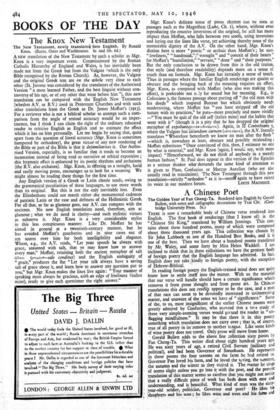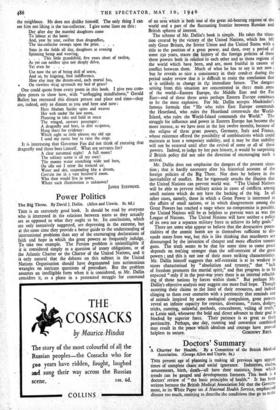A Chinese Poet
THERE is now a remarkable body of Chinese verse rendered into English. The first book of renderings (that I know of) is the " Chinese Shi King," translated by William Jennings. This con- tains about three hundred poems, many of which were composed about three thousand years ago. This collection was chosen by Sir John Lubbock as one of the Hundred Best Books, and it is one of the best. Then we have about a hundred poems translated by Mr. Waley, and some forty by Miss Helen Waddell. I am inclined to think that in these collections we have the greatest body of foreign poetry that the English language has admitted. In fact, English does not take kindly to foreign poetry, with the exception of Hebrew-Biblical.
In reading foreign poetry the English-trained mind does not quite know how to settle itself into the matter. With us the material that our verse will handle should have a certain significance which removes it from prose thought and from prose art. In Chincse translations this does not readily appear to be the case, and a poet of that race can seem to be devotedly interested in uninteresting matter, and unaware of the sense we have of " significance." Sonic of the, to us, most insignificant of the earlier Chinese poems were greatly admired by Confucius, who asserted that a tri.e study of these very simple-seeming verses would ground the reader in "un- flagging mindfulness." It may be that there is in this poetry something which translation does not carry over ; that is, of course, true of all poetry in its'remove to mother tcrigue. Like some kinds of wine poetry does not travel. Only prose will move from home. Gerald Bullett adds to the above fine ollection sixty pieces by Fan Cheng-Ta. This writer died about eight hundred years ago. He was sixty years of age, a retired Civil Servant (military and political), and had been Governor of Szeuohuan. He represents in these poems the four seasons on the farm he had retired to Governor Fan loved his farm, and he loved the sitting, the summer, the autumn and the winter as they visited it. The matter he sings of seems slight unless you go into it with the poet, and the present translation of this matter seems so carefree that you might not notice that a really difficult piece of work has bedn done with ease and understanding, and is beautiful. What kind of man was the sixty- Near-old soldier, politician, Governor and poet? He likes his :daughters and his sons; he likes wine and trees.and his farm and
the neighbour. He does not dislike himself. The only thing I can see him not liking is the tax-collector. I give some lines on this: Day after day the married daughters come To labour at the loom: And, year by year, swifter than dragonflies, The tax-collector swoops upon the prize. . . .
Sons in the fields all day, daughters at evening Spinning hemp and weaving, . . . This little grandchild, five years short of twelve, As yet can neither spin nor deeply delve, Yet even he . . .
Use now the art of being dull of sense, And so, by feigning, find indifference.
How else may the dream-soul, each mortal has, • On viewless wiag apDroach my bed of grass?
One could quote from every poem in this book. I give two com- plete pieces to show how, with "unflagging mindfulness," Gerald Bullett has recreated this distant person and place and time—they
are, indeed, only as distant as.you and here and now:
Here Madam Spider spins and weaves Her web under the low eaves, Planning to take and hold in snare The winged, unwary passenger: A dragonfly and bees, in dire suspense, Hang there for evidence: Which sight so little pleases my old age I send any rustic boy to raise the siege.
It is interesting that Governor Fan did not think of rescuing that dragonfly and those bees himself. What are servants for? A clear autumnal night! A full moon!
The solitary scene is all my own! The moony water stretching wide and bare, On idle oar I enter the tranced Water and sky, suspending like a dream, Contain me in a vast besilver'd room.
Who then would live in town,
Where such illumination is unknown?
JAMES STEPHENS.



























 Previous page
Previous page